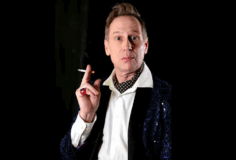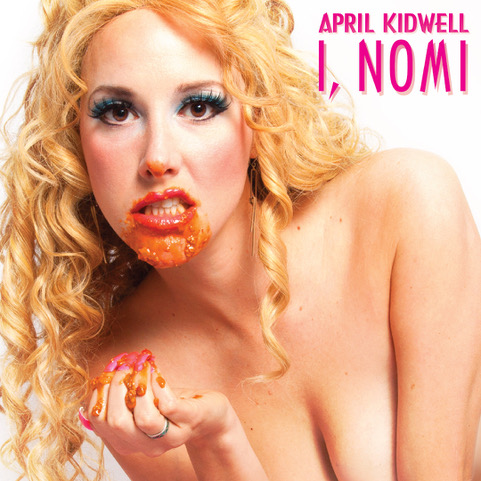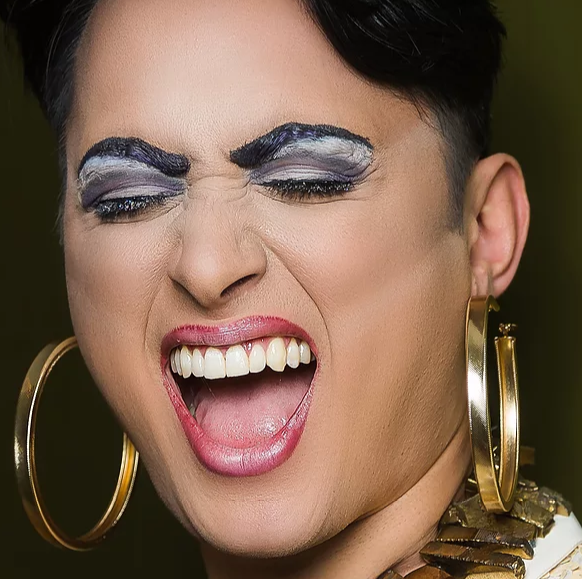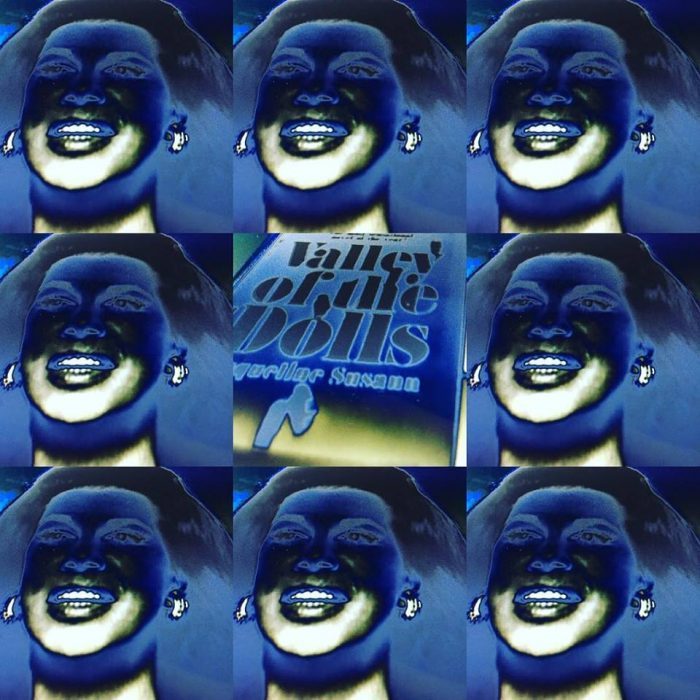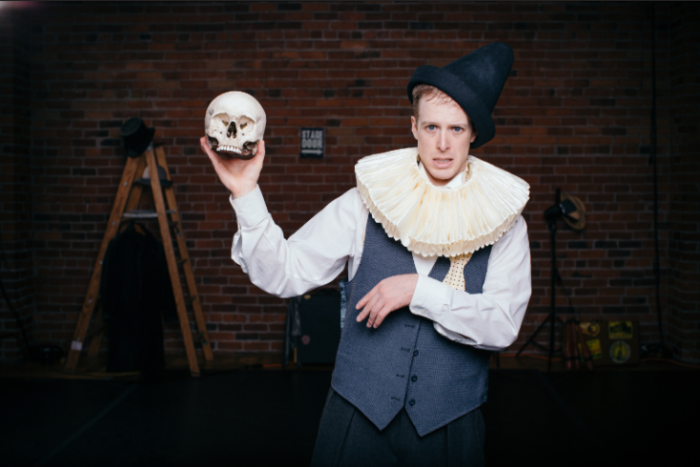
Actor Mickey Rowe will star in “The Fool” at Columbia City Theatre on Saturday, May 5, 2018. All photos by Joe Moore (Smokescreen Media)
Mickey Rowe is a multi-talented actor. He was the first autistic actor to play the role of an autistic person in a Broadway-originating show. This happened when he played the main role of Christopher Boone in two regional productions of the international award winning play, The Curious Incident of the Dog In the Night-time. On May 5th, Seattlites get a chance to see Mickey Rowe’s new comedic solo show, The Fool at Columbia City Theatre. I caught up with him between rehearsals at a Belltown coffeeshop to interview him and I learned a lot about the intersections between autism and theatre.
Mickey calls Seattle home. He’s lived here all his life and grew up in West Seattle. Autism has been something that he has grown comfortable with as an important part of his life. He was in special education throughout school but he was told that his challenges were because of his eyesight, because he also has a visual impairment. The educators and healthcare providers around him missed the autism diagnosis during his childhood and he only got diagnosed as an adult. He uses identity-first language to talk about his autism.
“Looking back, I can see that some care providers probably knew I was on the spectrum and assigned speech therapy and occupational therapy to me anyway, even though the diagnosis had not happened yet,” he explains. “No one talked to me about being on the spectrum, so I didn’t know I was on the spectrum. When I became an adult, my girlfriend, who is now my wife, felt that I need to go see a therapist to address the challenges I was facing. I got a recommendation to the UW Adult Autism Clinic. They assessed me and diagnosed me. They explained to me what was going on and it gave me a huge sense of relief. When I was diagnosed, nothing about me really changed. I just got the words to explain my experience in life. I said to myself, “I am not stupid. I just have autism”.
Mickey was accepted into the University of Washington’s Drama Program as an undergraduate after finishing high school. But the challenges he faced made him realize that he won’t be able to finish the program. This didn’t stop him from landing several roles in productions with Seattle Opera and Seattle Children’s Theatre.
“Language expression and working with language is a challenge for me,” he says. “But I excel at roles that don’t have a lot of lines. I’ve been cast in about 8 shows with Seattle Opera and 4 shows with Seattle Children’s Theatre, focusing on movement work and physical theatre. I was cast here and there with small speaking parts in other shows, but “Curious Incident” was my first important speaking role, and I was the main character”.
Indiana Repertory Theatre’s production of The Curious Incident Of The Dog In The Night-time, with Mickey Rowe in the main role of “Christopher Boone”, an autistic British 15-year old living in a broken home and investigating a mystery, toured further to Syracuse, NY. The play, based on the best selling novel of the same name, won the Tony Award for Best Play in 2016 and has had successful runs all over the world. But Mickey was the first autistic person to have ever played the role, which made national news. It was an important moment for the autistic community, to have someone from their community representing them on stage in a role for an autistic person. Anyone who has watched the show knows that the role of Christopher Boone is a very physical one, with several stunts being done on stage to represent the world of autistic cognition. It is an incredible show that provokes the mind to think differently about the current media portrayals of autistic experiences.
“The British accent was a bit of a challenge!” chuckles Mickey. “Doing a show in dialect makes it less about you and more about the character. It makes it easier to be someone else, especially when all the other characters around you are also in dialect.”

Actor Mickey Rowe will star in “The Fool” at Columbia City Theatre on Saturday, May 5, 2018. All photos by Joe Moore (Smokescreen Media)
We get to talking about his upcoming show, The Fool. He is very excited about it because it helps to showcase his multiple talents in movement, clown work and solo-acting. He has many good things to say about his director, Emily Penick, who recently directed the incredible all-female Shakespeare show Coriolanus: Fight Like A Bitch.
“Emily and I had been acquaintances for a while and knew of each other. While I was doing “Curious Incident”, she reached out to me about doing a show that she was directing. Since I am a member of Equity, it wasn’t the right fit. But then I came up with this show, The Fool, and I recruited her to be my director. It sounded like an exciting project to her as well and it has been wonderful working with her. I am so honored and privileged that she is my director. ” says Mickey.
He feels that he has really grown as a performer through preparing for this show. “It’s been really awesome using her brilliant skills at telling stories and creating characters. My physical skills have also improved: juggling, acrobatics and movement work. We have very short rehearsals in the mornings, three days a week. But I always leave amazed at how much we were able to create in such a short period of time. Everything is falling together in a magical special way. Of course, the autism means that not everything works so smoothly, but Emily has been wonderful about everything. We’ve taken all the juggling, magic, balancing and plate-spinning skills that I already had. Emily added some character and some Shakespeare, and made a show out of it. We’re very proud of it”
The Shakespearean aspects of The Fool have already earned it entry into the prestigious Oregon Shakespeare Festival. It will be playing on the Green Show Stage on August 19th and August 21st.
I ask him about the historical connotations to the word “fool” being used in the context of autism. Before autism was a diagnosed condition, people who manifested the symptoms of autism were labeled as “village fool” or “fools for God” (they would sometimes end up in monasteries). I am curious about whether the title of the show is associated to this usage of the word, in a kind of reclamation of the label. Mickey responds, “Yes and no. I do love the connection between the historical usage of the word “fool” and the title of my show. But the truth is that I often feel like a fool, because of miscommunications and missed opportunities in situations where things don’t line up for me socially. Yes, I feel like a fool, in all connotations of that word. At the same time, we also have a literary archetype of The Fool. We see it in Shakespearean Fools, such as Bottom in A Midsummer Night’s Dream, Touchstone in As You Like It, the Fool in King Lear and so on. Of course, we should not mistake these with Shakespearean Tricksters (such as Puck in A Midsummer Night’s Dream).”
“In general, my show is clowning with a story line, with all the special skills I know being thrown into the show. Today, in rehearsal, Emily and I were working on something where we have a condensed Shakespeare text we are working with. It’s another play, performed in about 60 seconds, using juggling balls and juggling knives. I use these items to illustrate the text itself and make it funny. This will give you an idea of how my show will play out.”, he explains.
He then explains to me one of the more challenging stunts that will happen during the show. One of them involves a six foot tall A-frame ladder. When they were brainstorming about the shape of the show, one of the things they really wanted to happen was that they wanted Mickey falling head-first down the ladder, with a top hat on the ground. As he slips, he falls with his head falling perfectly into the hat, while making it look accidental and chaotic. They are currently working on making it completely safe and easy for replicating.
“It’s all about very well-rehearsed moments that look like miraculous accidents, that just happen to work at the right time,” he says proudly.
“When we think of a Fool, we think Chaos and Unpredictability. So this show is really a lot of well-rehearsed chaos. A lot of the show is choreographed to music, and that is a challenge for me to master. There is also a straitjacket routine that is a bit controversial. A lot of things happen simultaneously, to music, and all of it is SO TECHNICAL!”
The show runs for about 50 minutes and the venue has a bar. Mickey hopes that there can be social mingling before and after the show, for people to discuss things they have seen or are about to see, especially in the context of autistic performers like Mickey.
“It is de-stigmatizing and empowering for me to perform this way,” says Mickey. “To an audience without background knowledge about autistic lives, this show is still hilarious and celebratory. It is a celebration of vaudeville and the vaudevillian tool. To people who are familiar with autism, this show can be seen as a celebration of skill, comedy, success and yes, failure. There are many successes and failures throughout the show that the main character goes through. The audience feels these successes and failures with me. The real success, however, was that the audience was with you the whole time, following you every step of the way.”
One of the more interesting moments of the show is towards the end, which involve Mickey juggling 3 knives while riding a unicycle. “If that moment was in the beginning, few people would be invested in seeing it succeed. But over the course of the show, we make people feel as if they are rooting for the actor. You want each trick to work out but you are not sure if each trick will actually work. When everything works out at the end, the victor is earned. The audience feels that with the character. Like a baby, learning to walk, who finally starts walking with everyone watching.”
He explains further. “It’s like how we think about fight choreography. You are scared for the character getting hurt, but not for the actor getting hurt. If you’re scared about the actor getting hurt, it takes you out of the play. For my show, we want to make sure the audience has zero faith in the character’s abilities to succeed at the stunts, but still have confidence in my abilities as an actor. I am the tour guide for the evening’s journey. I’m the bus driver. They can trust me. But they don’t completely trust the character.”
I ask him about future projects that he is working on. He talks about more opportunities to direct a show. “I have directed shows before, and you can learn about them on www.mickeyrowe.me. I am currently looking for more opportunities to direct a show. So let me know if you’re interested in an autistic director!”
I ask him if he has any parting thoughts for the readers. And what he has to share is quite profound. “Temple Grandin says that it is useful for a certain number of people to be autistic, in this way. The person who invented the wheel was probably the one in the corner obsessing over this one thing, again and again, all by themselves, while everyone around them thought they were weird. I’m autistic but you should not feel sad or sorry for me, or anyone with autism. I am living my life and I love it. The only thing holding me and other autistic people back is society itself and its expectations on us.”
Mickey Rowe who made headlines last year as the first autistic actor to take the lead in the Tony Award winning “Curious Incident of the Dog In the Night-Time” is coming home to Seattle for a one night only engagement at the Columbia City Theater on May 5th. Made possible by 4Culture as part of their Arc Fellowship. The show is directed by Emily Penick.
“This show is sort of my way of showing the world we can create incredible, hilarious, touching work. We can create work at the highest level. You can hire us at your organization, and people with disabilities, we get the job done. And it’s just gonna be a lot of fun.” – Mickey Rowe
The Fool At Columbia City Theater in Seattle
Saturday May 5th at 7:30pm.
http://thefool.brownpapertickets.com
$7.00
21+ venue with a bar.
All photos by Joe Moore (Smokescreen Media).


